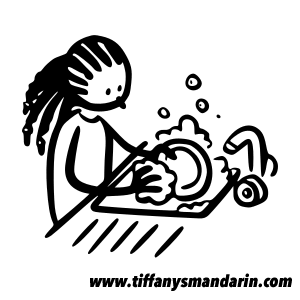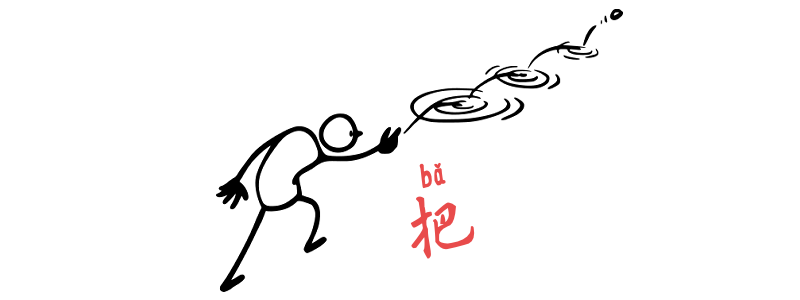Grammar Point:
There are 3 functions of 把 bǎ in Chinese. Determination, command, and doing a movement on something that makes a change to it. And since 把 bǎ cannot be translated into English, many English speakers feel awkward using it. But it is a piece of grammar that Chinese native speakers use a lot in daily conversation.
Why do we need 把?
The short answer is to emphasize the object. Unlike in English, in Chinese, the most important information is usually provided at the beginning of a sentence. Therefore, we tend to place time and people at the beginning. But what if we want to emphasize a particular object that is very important? Easy! Just move it to the beginning. This will change “an object” to “the object.” Then, we can keep the verb at the end of the sentence, which makes it easy to add more explanations or further information to support it. And these explanations and information are called complements.
When Do We Use It
- Determination (usually with “I” as the subject): This is used to express one’s determination or resolve to do something.
- Command (usually with “you” as the subject): This is used to give a command, requirement, or instruction. It can also be used when talking about moving something or decorating.
- Action that produces a change in something (usually with a known object): This is the most common sentence pattern. We use this pattern when referring to something that has happened to ‘the known object‘.
Before We Start
- It is only used for something that both the listener and the speaker know.
- We cannot use it for feelings: love, feel, hate, like, loss, etc.
- It always needs something after the verb.
- All negation words and adverbs should be put in front of 把 bǎ.
What Can Be That ‘Something After the Verb’
There are 5 kinds of something that can go with 把 bǎ.
- Result Complements: 了 le, 完 wán, 开 kāi, 关 guān, 得 de, etc.
- Directional Complements: 进去 jìnqù, 出来 chūlái, 上去 shàngqù, 下去 xiàqù, etc.
- Quantity Complements: 一次 yícì, 十遍 shíbiàn, etc.
- Special Verbs: 在 zài、到 dào、給 gěi、成 chéng
- Showing Short Time: V了V, V一V, V一下
We are not going to talk about all the
Structure
First, you need to know about 把 bǎ, which changes the order of Chinese sentences. We have learned Chinese sentence’s structure is subject + verb + object, but with this 把 bǎ, it becomes subject + 把 bǎ + object + verb + something. (That something is necessary and very important in the 把 bǎ structure.)
S + 把 + O + Verb + Quantity Complements

我要把這本課本讀3遍我要把这本课本读3遍
I want to read this textbook 3 times.
(Determination)
老師要我把這個字寫10次老师要我把这个字写10次
The teacher asked me to write this character 10 times.
(Command)
請你把剛剛的話再說一次请你把刚刚的话再说一次
Please say what you just said again.
(Command)
S + 把 + O + Verb + (一)Verb/ Verb 一下
All of these structures indicate a brief or “a little bit” action. Please note that this structure cannot be used with negation.

你先去把廚房的碗洗一洗你先去把厨房的碗洗一洗
You go wash the kitchen dishes first.
(Command)
等我一下,我把頭髮梳梳就去等我一下,我把头发梳梳就去
Give me a second. I’ll brush my hair and go.
(Determination)
同學們再把試卷檢查一下吧同学们再把试卷检查一下吧
Classmeats, please check your papers again.
(Command)
S + 把 + O + (給/给) + Verb + 了or 著/着
In spoken Chinese, we use 给 gěi to emphasize the verb. It’s okay to drop it, but Chinese native speakers prefer to keep it. This is also true for the 被 bèi structures.
他把學過的生詞都給忘了他把学过的生词都给忘了
He forgot all the vocabulary he had learned.
(Doing a movement “forgot” on vocabulary that makes all gone.)
你別忘了把護照帶著你别忘了把护照带着
Don’t forget to take your passport with you.
(Command)
Exception 都
都 dōu is one of the adverbs that can be put either in front of 把 bǎ or after it. Depending on where you put it, the meaning will be different.
學生們都把書帶來了学生们都把书带来了
All students brought their books.
學生們把書都帶來了学生们把书都带来了
The students brought all their books.
Practice
TouchHover over the space to see the answers.
✔️ I’ve read this article 5 times, but I still can’t understand it.
我把這篇文章看了5次,可是我還是看不懂我把这篇文章看了5次,可是我还是看不懂
✔️ Could you please keep your mouth shut for a moment?
可以請你把嘴巴閉起來一下嗎?可以请你把嘴巴闭起来一下吗?
✔️ Remember to turn off the lights before going out.
出門前記得把燈給關了出门前记得把灯给关了
- 把 bǎ Part 1 (HSK 3)
- 把 bǎ Part 3 (HSK 5)
- 把 bǎ Part 4 (HSK 6)
- Advanced 把 bǎ Part 5 (HSK 7-9)


